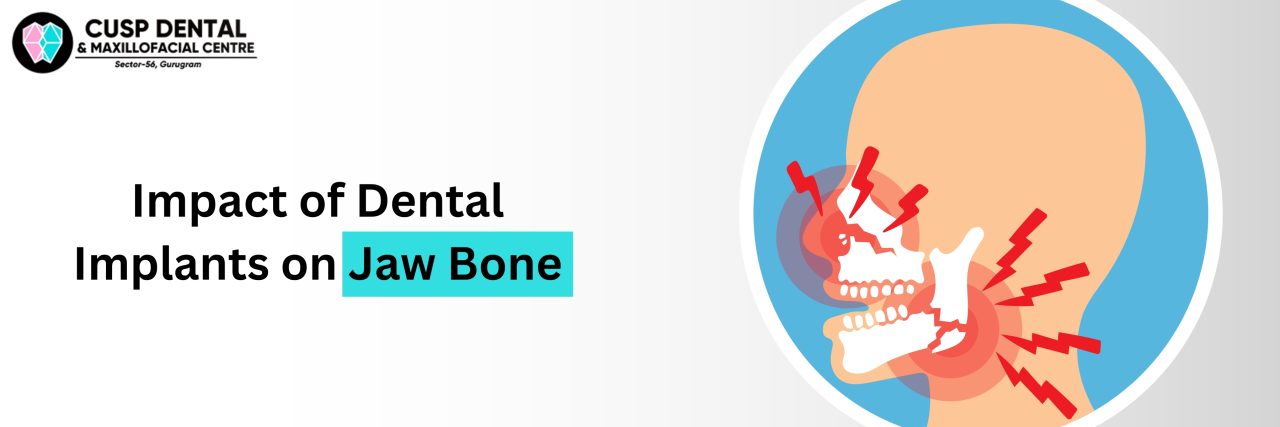Tooth loss isn’t just a smile issue, because it’s a deep personal struggle that truly impacts the person who is experiencing this currently. The visible gap in a person’s smile leads to significant frustration and considerable mental distress. However, dentistry has one good option, which is called a dental implant, that not just helps restore lost teeth but also preserves the jawbone itself.
But how exactly do implants impact the bone? Let’s explore through this blog.
What Happens to the Jaw Bone After Tooth Loss?
Your jawbone is living tissue that depends on regular stimulation—primarily from chewing and biting—to stay strong and dense. When a tooth is lost:
- The bone underneath begins to shrink due to lack of use, a process called bone resorption.
- Over time, this leads to facial sagging, weakened jaw structure, and even shifting of surrounding teeth.
In fact, according to studies, you can lose 25% of jawbone width within the first year after losing a tooth—and even more in the years following.
What Are Dental Implants?
Dental implants are titanium posts surgically inserted into the jawbone where the tooth root used to be. They are similar to artificial roots and support a crown, bridge, or denture.
Because they are embedded into the bone, they stimulate the jaw in the same way natural teeth do.
How Dental Implants Help Preserve Jaw Bone
Here’s how implants positively impact your jaw health:
1. Prevent Bone Loss (Resorption)
In contrast to dentures or bridges that sit on top of the gum, dental implants fuse with the jawbone through a process called osseointegration.
✅ This fusion stimulates the bone, preventing shrinkage or deterioration over time.
2. Maintain Facial Structure
Bone resorption after tooth loss can lead to sunken cheeks, wrinkles around the mouth, and a prematurely aged look.
✅ Dental Implants procedure helps retain bone volume, preserving your natural facial shape.
3. Support Adjacent Teeth
When a tooth is lost, nearby teeth can also drift or tilt into the space, which causes bite problems and misalignment.
✅ An implant fills that space and keeps surrounding teeth in their proper position.
4. Promote Long-Term Oral Health
Implants do not need grinding down adjacent teeth (as bridges do), that protects healthy enamel.
✅ This keeps more of your natural dental structure intact, which is critical for long-term oral health and jaw integrity.
Dental Implants vs. Other Options for Bone Health
| Feature | Dental Implants | Dental Bridges | Removable Dentures |
| Bone Preservation | Yes (via stimulation) | No | No |
| Tooth Stability | High (integrated into bone) | Moderate (depends on adjacent teeth) | Low (can move/slip) |
| Longevity | 15–25+ years | 5–15 years | 5–7 years |
| Facial Structure Support | Strong | Minimal | Minimal |
| Tooth Preservation | No damage to nearby teeth | Requires shaping of adjacent teeth |
Clearly, implants are the only tooth replacement method that maintains bone health over time.
Read More: How Long Does the Dental Implant Process Take?
When to Get an Implant for Best Bone Health
Timing matters. As a matter of fact, if a person waits longer after tooth loss, the more bone you may lose—making it harder or impossible to place an implant without a bone graft.
Ideal timing:
- Immediately or within a few months after tooth extraction
- If delayed, consult your dentist to evaluate bone volume and density
What If You Already Have Bone Loss?
Don’t worry—modern dentistry offers solutions:
Bone Grafting
A procedure where synthetic or natural bone material is added to rebuild the jaw, making it strong enough to support an implant.
✅ Bone grafts restore lost volume and provide a stable base for future implants.
Other Benefits of Dental Implants (Beyond Bone Health)
- Improved chewing ability and digestion
- Natural appearance and feel
- Boosted confidence in social and professional life
- No slipping or discomfort, unlike removable dentures
All of these improve quality of life, especially when combined with the structural benefits for your jaw.
Who Is a Good Candidate for Dental Implants?
To benefit from jaw-preserving implants, you should:
- Have good general and oral health
- Possess a proper jawbone (or be willing to undergo grafting)
- Be a non-smoker or ready to quit (smoking impairs healing)
- Commit to regular dental hygiene and checkups
Final Thoughts: Implants Are a Long-Term Investment in Jaw Health
Losing a tooth isn’t just a cosmetic issue—it sets off a chain reaction of bone loss and structural changes. Dental implants break that cycle.
By mimicking the function of natural roots, implants stimulate bone growth, maintain facial structure, and protect oral health for the long term.
If you’re missing one or more teeth, don’t wait. Talk with an expert dentist at the best dental clinic, such as Cusp Dental Clinic in Gurgaon , so that you can determine whether implants are right for you—and take a powerful step toward protecting your jawbone and your smile.


